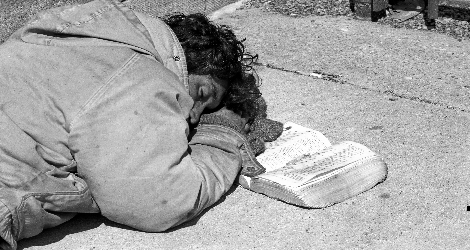Work (labor and calling)
A third way Christian theology and the theory undergirding modern economics differ in their worldviews is regarding their understanding of work. Economic theory views work as an input to production. Labor is an input into economic activity that helps increase the overall wealth of a society. But, labor is not the only factor of production; capital is the other. Land and environmental resources, viewed as they are by classical economic theory as inexhaustible, are not understood as factors of production. They are givens. The decision, to define the factors of production in this narrow way, suggests that the assumptions that undergird the theory informing our decision making are unrealistic at best.[8]
Labor, as one factor of production, is subject, as is everything else in the worldview of economic theory, to the laws of supply and demand. A glut of people who can perform the duties required for specific tasks drives down the cost of labor in that field. If there are only a few who can perform the duties of a position in another field, such as the position of quarterback of the Indianapolis Colts, then this position’s compensation will reflect the scarcity of people who can perform up to the expectations of the fans of this professional organization. Labor, as a mere input to production, is subject to market determined pricing. Justice—a set of theologically determined ideas about what one human being owes another, or of what kind of communities God wills us to create—is not considered by the market’s mechanisms. Justice is, in fact, irrelevant to the market mechanism that determines the compensation of human beings who bleed out their life’s energy on behalf of accumulated capital the world over.
In contrast, Christian theology views work as a service done to God, not just to the employer. Work is a way of contributing to the common good, an effort for which, according to Thomas Aquinas’ understanding of a just wage, a person should be compensated to provide adequately for her family’s needs. Reformation theology rejects a rigid distinction between a holy life and the life of ordinary people. Each person has a divine calling to serve his or her neighbor through work.
Although work was valued in Calvin’s theological explorations of vocation, and profit was looked upon as a sign of God’s blessing, Calvin condemned profit making as the chief end of enterprise. In Calvin’s own words:
It is not enough when one can say, I work, I trade, I set the pace. This is not enough; for one must be concerned with whether it is good and profitable to the community and able to serve our neighbors…it is certain that no occupation will be approved by Him [God] that is not useful and that does not serve the common good and that also redounds to the profit of everyone.[9]
In response to all of those who have argued that Calvin embraced capitalism, it should be pointed out that he, at best, held it at arm’s length. Finally, he embraced only the sovereign God, evaluating human enterprise according to the extent to which it enabled his fellow human beings to serve God.[10]









I regret to say that I find Reverend Owen’s article frustrating. It would have been helped if she had started with a definition of capitalism. An acknowledgement of different types of capitalism would have clarified that her real beef is with totally laissez faire markets. One could then ask whether this is the political-economy we have, or whether it is an ideology vying to reshape our common life. This would have strengthened her argument which seems more oriented to reforming capitalism rather than replacing it with some other economic system.
She names Max Stackhouse as a defender laissez faire. She can only do this because she seems to have no idea what he affirmed or why. The choice, Stackhouse says, is between locating the economy in the family, the state, or the social space between them that had been carved out by the church – corporations. Separating the economy from the state allows states to engage in the sort of regulation she suggests in her conclusion.
Her characterization of is also unfair because Stackhouse brings considerable theological and ethical resources to bear to critique and humanize capitalism. Indeed, this is the church’s vocation! Engagement with his ideas would have clarified Owen’s muddle on the relationship between economics and theology. In all of this his is closer to a “New Deal” affirmation of capitalism than laissez faire. And so is she!